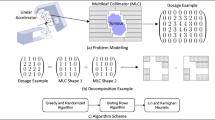Abstract
The multileaf collimator sequencing problem is an important component of the effective delivery of intensity modulated radiotherapy used in the treatment of cancer. The problem can be formulated as finding a decomposition of an integer matrix into a weighted sequence of binary matrices whose rows satisfy a consecutive ones property. In this paper we extend the state-of-the-art optimisation methods for this problem, which are based on constraint programming and decomposition. Specifically, we propose two alternative hybrid methods: one based on Lagrangian relaxation and the other on column generation. Empirical evaluation on both random and clinical problem instances shows that these approaches can out-perform the state-of-the-art by an order of magnitude in terms of time. Larger problem instances than those within the capability of other approaches can also be solved with the methods proposed.
This work was supported by Science Foundation Ireland under Grant Number 05/IN/I886.
Access this chapter
Tax calculation will be finalised at checkout
Purchases are for personal use only
Preview
Unable to display preview. Download preview PDF.
Similar content being viewed by others
References
Agazaryan, N., Solberg, T.D.: Segmental and dynamic intensity-modulated radiotherapy delivery techniques for micro-multileaf collimator. Medical Physics 30(7), 1758–1767 (2003)
Ahuja, R.K., Hamacher, H.W.: A network flow algorithm to minimize beamon time for unconstrained multileaf collimator problems in cancer radiation therapy. Netw. 45(1), 36–41 (2005)
Baatar, D., Boland, N., Brand, S., Stuckey, P.J.: Minimum cardinality matrix decomposition into consecutive-ones matrices: CP and IP approaches. In: Van Hentenryck, P., Wolsey, L.A. (eds.) CPAIOR 2007. LNCS, vol. 4510, pp. 1–15. Springer, Heidelberg (2007)
Baatar, D., Hamacher, H.W., Ehrgott, M., Woeginger, G.J.: Decomposition of integer matrices and multileaf collimator sequencing. Discrete Applied Mathematics 152(1-3), 6–34 (2005)
Bahr, G.K., Kereiakes, J.G., Horwitz, H., Finney, R., Galvin, J., Goode, K.: The method of linear programming applied to radiation therapy planning. Radiology 91, 686–693 (1968)
Boland, N., Hamacher, H.W., Lenzen, F.: Minimizing beam-on time in cancer radiation treatment using multileaf collimators. Networks 43(4), 226–240 (2004)
Bortfeld, T.R., Kahler, D.L., Waldron, T.J., Boyer, A.L.: X-ray field compensation with multileaf collimators. International Journal of Radiation Oncology Biology Physics 28(3), 723–730 (1994)
Boyd, S., Xiao, L., Mutapic, A.: Subgradient methods. In: Notes for EE392o, Standford University (2003)
Brand, S.: The sum-of-increments constraints in the consecutive-ones matrix decomposition problem. In: SAC 2009: 24th Annual ACM Symposium on Applied Computing (2009)
Cambazard, H., O’Mahony, E., O’Sullivan, B.: A shortest path-based approach to the multileaf collimator sequencing problem. In: van Hoeve, W.-J., Hooker, J.N. (eds.) CPAIOR 2009. LNCS, vol. 5547, pp. 41–55. Springer, Heidelberg (2009)
Collins, M.J., Kempe, D., Saia, J., Young, M.: Nonnegative integral subset representations of integer sets. Inf. Process. Lett. 101(3), 129–133 (2007)
Desaulniers, G., Desrosiers, J., Solomon, M.M.: Column Generation. Springer, Heidelberg (2005)
du Merle, O., Villeneuve, D., Desrosiers, J., Hansen, P.: Stabilized column generation. Discrete Math. 194(1-3), 229–237 (1999)
Ehrgott, M., Güler, Ç., Hamacher, H.W., Shao, L.: Mathematical optimization in intensity modulated radiation therapy. 4OR 6(3), 199–262 (2008)
Engel, K.: A new algorithm for optimal multileaf collimator field segmentation. Discrete Applied Mathematics 152(1-3), 35–51 (2005)
Ernst, A.T., Mak, V.H., Mason, L.A.: An exact method for the minimum cardinality problem in the planning of imrt. INFORMS Journal of Computing (2009) (to appear)
Focacci, F., Lodi, A., Milano, M.: Cost-based domain filtering. In: Jaffar, J. (ed.) CP 1999. LNCS, vol. 1713, pp. 189–203. Springer, Heidelberg (1999)
Hamacher, H.W., Ehrgott, M.: Special section: Using discrete mathematics to model multileaf collimators in radiation therapy. Discrete Applied Mathematics 152(1-3), 4–5 (2005)
Kalinowski, T.: The complexity of minimizing the number of shape matrices subject to minimal beam-on time in multileaf collimator field decomposition with bounded fluence. Discrete Applied Mathematics (in press)
Kalinowski, T.: A duality based algorithm for multileaf collimator field segmentation with interleaf collision constraint. Discrete Applied Mathematics 152(1-3), 52–88 (2005)
Langer, M., Thai, V., Papiez, L.: Improved leaf sequencing reduces segments or monitor units needed to deliver imrt using multileaf collimators. Medical Physics 28(12), 2450–2458 (2001)
Lübbecke, M.E., Desrosiers, J.: Selected topics in column generation. Oper. Res. 53(6), 1007–1023 (2005)
Menana, J., Demassey, S.: Sequencing and counting with the multicost-regular constraint. In: van Hoeve, W.-J., Hooker, J.N. (eds.) CPAIOR 2009. LNCS, vol. 5547, pp. 178–192. Springer, Heidelberg (2009)
Sellmann, M.: Theoretical foundations of CP-based lagrangian relaxation. In: Wallace, M. (ed.) CP 2004. LNCS, vol. 3258, pp. 634–647. Springer, Heidelberg (2004)
Caner Taskin, Z., Cole Smith, J., Edwin Romeijn, H., Dempsey, J.F.: Collimator leaf sequencing in imrt treatment planning. Operations Research 119 (2009) (submitted)
Wake, G.M.G.H., Boland, N., Jennings, L.S.: Mixed integer programming approaches to exact minimization of total treatment time in cancer radiotherapy using multileaf collimators. Comput. Oper. Res. 36(3), 795–810 (2009)
Author information
Authors and Affiliations
Editor information
Editors and Affiliations
Rights and permissions
Copyright information
© 2010 Springer-Verlag Berlin Heidelberg
About this paper
Cite this paper
Cambazard, H., O’Mahony, E., O’Sullivan, B. (2010). Hybrid Methods for the Multileaf Collimator Sequencing Problem. In: Lodi, A., Milano, M., Toth, P. (eds) Integration of AI and OR Techniques in Constraint Programming for Combinatorial Optimization Problems. CPAIOR 2010. Lecture Notes in Computer Science, vol 6140. Springer, Berlin, Heidelberg. https://doi.org/10.1007/978-3-642-13520-0_9
Download citation
DOI: https://doi.org/10.1007/978-3-642-13520-0_9
Publisher Name: Springer, Berlin, Heidelberg
Print ISBN: 978-3-642-13519-4
Online ISBN: 978-3-642-13520-0
eBook Packages: Computer ScienceComputer Science (R0)




